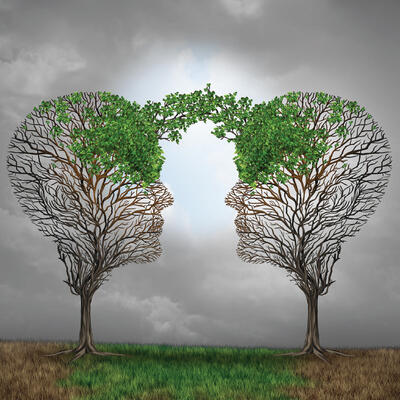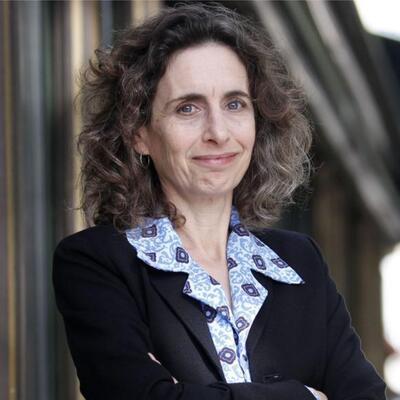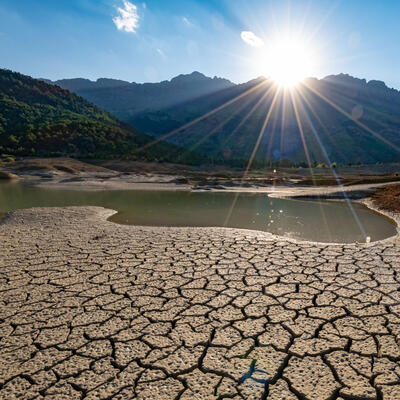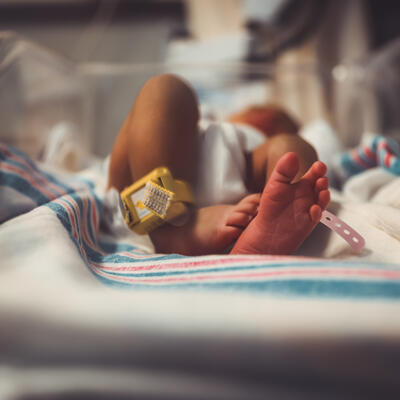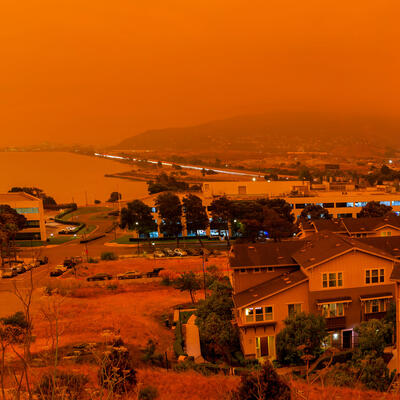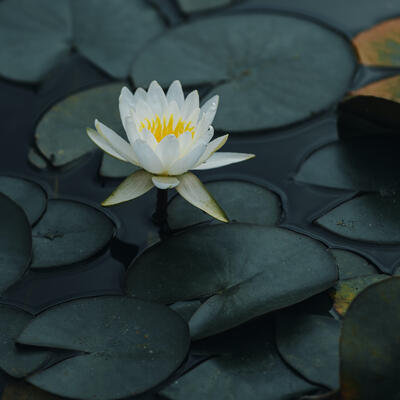
Zen and Coping with Climate
Guests
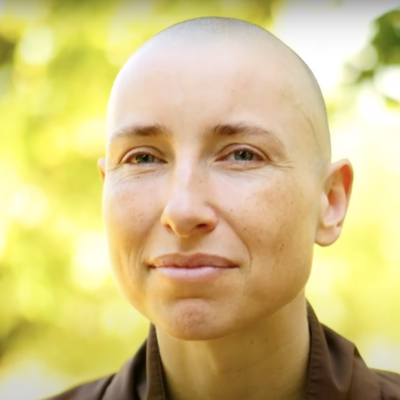
Sister True Dedication
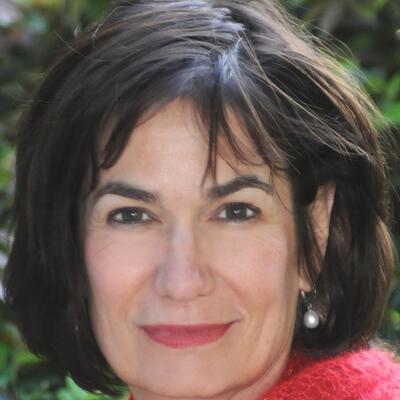
Leslie Davenport
Summary
More and more of us are seriously worrying about what we’ve done to the earth’s climate. But while climate predictions can be scary, Sister True Dedication says we don’t have to live in a place of fear or denial.
“We all need a real practice to be able to not be afraid of our fear and not be afraid of our despair and anxiety and to learn some really concrete practices to be able to acknowledge it, and recognize it and embrace it every time it comes up,” she says.
In fact, the Zen Buddhist nun says accepting and even leaning into these difficult feelings can make us stronger and more ready to act.
Sister True Dedication is editor of internationally renowned Zen master Thich Nhat Hanh’s latest book, Zen and the Art of Saving The Planet. She says while the climate crisis is urgent, living in a constantly reactive state is unhealthy and doesn’t help us take action. But there are approaches that can help:
“The power of Zen and the power of mindfulness is that it roots this in the present moment so we can be alert to what is going on, we can be responsive, we can be the master of our mind and awareness in any given situation,” she says. “So, we can really have the present moment as the ground for our urgent action and that is action taken with clarity, with courage, with solidity, with freedom, and not with panic.”
She offers simple guidance for someone interested in beginning a mindfulness practice: take some time for yourself, outside in nature if possible, and relax your body with mindful breathing.
“And then just take time to listen,” Sister True Dedication says. “Say we’re out and sitting underneath a tree, just to listen to the birds and if we’re listening to the birds, we know we’re in the present moment. We know we’re alive, we know we are in touch with the miracle of life.”
Psychotherapist Leslie Davenport is author of several books, including Emotional Resiliency in the Era of Climate Change. Her new book, All the Feelings Under the Sun: How to Deal With Climate Change, is targeted at middle-school kids and guides them through exercises designed to build their emotional resilience.
Davenport says many kids struggle with climate anxiety and grief, particularly as they get into high school and early college.
“It's the time in life when you look to the future. Do I want to get married, what kind of relationship would I want, what's my career path, what do I dream and envision my life might look like? And that’s where the youth today are really feeling the climate anxiety and the climate grief because they are tuned in to the scientific projections about what could unfurl, especially without significant and immediate action,” she says.
Davenport says there’s a tremendous need to support our youth, not only in the 16 to 24 age range but also younger children her book is targeted at, to help them develop emotional resilience tools to be prepared for those feelings they’ll encounter as they grow.
Davenport suggests parents and caregivers first take care of their own emotions, so they can model strength and resilience for their children. And then when supporting children:
“Make room for and welcome the feelings. Validate that the feelings are there because you care, because you're paying attention, because it is distressing what's happening to the environment and people and our biosphere as a whole.”
Related Links:
Full Transcript
Greg Dalton: This is Climate One. I’m Greg Dalton. More and more of us are seriously worrying about what we’ve done to the Earth’s climate.
Leslie Davenport: Eco-anxiety and eco-grief have just jumped way up in public awareness as well as the climate change issue as a whole.
Greg Dalton: Climate predictions can be scary, but we don’t have to live in a place of fear or denial.
Sister True Dedication: We all need a real practice to be able to not be afraid of our fear and not be afraid of our despair and anxiety and to learn some really concrete practices to be able to acknowledge it, and recognize it and embrace it every time it comes up.
Greg Dalton: A Zen Buddhist nun says accepting our feelings can make us stronger and more ready to act.
Sister True Dedication: The power of Zen and the power of mindfulness is that it roots us in the present moment so we can be alert to what is going on, we can be responsive, we can be the master of our mind and awareness in any given situation.
Greg Dalton: Zen and Coping with Climate. Up next on Climate One.
Greg Dalton: This is Climate One. Before we get into today’s show exploring emotional resilience in the face of the climate crisis, we’re continuing our weekly look at the COP26 climate summit in Glasgow next month.
Greg Dalton: Estimates suggest there are over 5 billion people of faith worldwide, and religions continue to be a dominant political and moral force even in societies driven by science and technology. This week, our correspondent Aman Azhar explores how world religions are intersecting with the climate movement in the run-up to COP26.
Aman Azhar: Religions’ outsized influence on many aspects of our personal, social, and political lives begs the question: what role should religious institutions play in the upcoming climate forum in Glasgow? Dr. Jennifer Herdt, professor of Christian ethics at the Yale Divinity School points to a growing movement among many religious leaders to weigh in on the climate crisis..
Jennifer Herdt: One basic indication of this is a meeting that was held just this past Monday, where 40 religious leaders from around the world gathered at the Vatican, representing 10 religious traditions, and together signed a joint climate appeal. That was planned to be delivered to the COP26 president in advance of the gathering in Glasgow in November.
Aman Azhar: Stephanie Kaza, educator and author of several books including Green Buddhism says world religions generally don't have a seat at forums such as COP because of their highly structured and political nature.
Stephanie Kaza: They are more effective in the non-governmental organization forums, the NGOs, that's where the environmental and social justice groups can use moral support and very much appreciate when the religions step forward to say, we believe in what you're doing, we want to support you.
Aman Azhar: Kaza says religious leaders of all faiths can also encourage or motivate their membership to be aware and engage more with climate issues.
Stephanie Kaza:These leaders have moral authority, and they are in the position to use their traditions, cultures, teachings, to address the tremendous moral injury inflicted on this planet, and also in a position to lead towards a more sustainable and positive future.
Aman Azhar: Jennifer Herdt says there’s several examples in the history where religious institutions advanced social movements.
Jennifer Herdt: Gandhian movement for Indian independence or the US civil rights movement, major movements for social change, have so often involved a central religious motivation, and a religious mobilization of people. So, this is not just, you know, nice words, icing on the cake. This is powerful.
Aman Azhar: She says the same could apply to the urgency to combat climate change. Herdt points out one problem is the perception that religious thought is opposed to science, which religious leaders are trying to address through statements like the one issued recently at the Vatican gathering.
Jennifer Herdt: One thing that I would point to in the US context, is the fact that increasingly we see evangelical Christian leaders who once were utterly indifferent to issues of climate change. Increasingly, we see these leaders calling for attention to the climate crisis, and calling for important forms a reinterpretation of the tradition, say, for example, away from the notion that human beings have been given dominion in the sense of, of an authorization to exploit nature, and instead understanding human responsibility for caretaking of nature.
Aman Azhar: But Herdt says a lot more work still needs to be done. In addition to the pressure from grassroots religious groups to mobilize climate action locally, Stephanie Kaza says the world leaders at COP need prayers and blessings.
Stephanie Kaza: I think that political leaders everywhere are under so much pressure to deliver solutions to the world. All the prayers and support they can get and I'm really serious about prayers in the sense of well-wishing, blessing, attention Giving. This is something that every religious practitioner, whether they're Muslim, or Jewish, or Christian, or Buddhist, or whatever they're practicing, they can offer their attention and well-wishing for good outcomes at the COP meetings.
Aman Azhar: Next month’s COP26 can be an effective forum for religions and science to join forces in combating the biggest existential threat facing humanity. For Climate One in Washington DC, this is Aman Azhar.
Greg Dalton: Today we’re talking about emotional resilience in the era of climate disruption. Sister True Dedication is a Zen Buddhist nun and editor of Thich Nhat Hanh’s latest book Zen and the Art of Saving The Planet. Internationally renowned Zen Master Thich Nhat Hanh was a refugee from the Vietnam War when Martin Luther King nominated him for a Nobel Peace Prize for his work to end that war. A few years later he actively worked to rescue other Vietnamese refugees. I asked Sister True Dedication how that experience shaped his understanding of what he calls “awakened action.”
Sister True Dedication: I think around the time when Thay was calling for peace (so we call Thich Nhat Hanh “Thay” - it means teacher). When he left Vietnam to call for peace and actually that's what led to his exile, that he had dared to call for peace. And it was while he was traveling the world calling for peace that he became aware of the situation of the boat people. At the time he reflected something like this he said, if compassion doesn't lead to action how can you call it compassion? So, there’s really the sense in the whole of Thay’s life that compassion has to be expressed in the way we live our life, the way we speak, the way we act, the way we engage. So, compassion isn’t something that you cultivate in the sitting meditation position in a monastery or a temple, but it's something that should really be embodied with how we spend our time and energy.
Greg Dalton: Right. So, if action is healing, how does that apply to climate?
Sister True Dedication: Well, Thay is so powerful on this and I remember we were at the Parliament in the UK in London when he said something like this. He said, what is that the root of the problem we don't need more science; we have enough science, we don't need more technology, we have the technological solutions. We even have the policies. What is lacking is the insight, the way of seeing and thinking in our collective consciousness in the human psyche. There is something that we haven't woken up to. So, for Thay, contemplation, mindfulness and meditation have to do with the climate crisis is actually in this moment we all being called to a much deeper, braver awakening that hasn't happened yet. We have to really wake up to the severity of the situation and change our whole way of seeing and for Thay perhaps we could call it insight. We all need to get a certain insight and it’s the insight that we don't have and that’s why, you know, it’s so difficult to take action.
Greg Dalton: I often encounter people in the climate conversation who are so scared and so worried about the urgency that we must act quickly. I think people are so scared they think that any action is good action and other people will say, no, we need to slow down and think about more intentional action. But that seems hard to do when literally the earth, our home is on fire.
Sister True Dedication: I think even as Buddhists we acknowledge the urgency of the situation. The question is how do we respond to that urgency and how can we get the strength we need, the insight we need to not panic. And I think what happens to a lot of us in the urgency is we're in a knee-jerk mode, in a reactive state in our own lives, and just we really have to remember that the activists, the scientists, the people who are working in the forefront of tackling the climate crisis, we’re all human beings. And that urgency--we can't live in that state of heightened arousal, you know, it can destroy our body and mind. So, we are also part of the earth and so we want to contribute in such a way that is sustainable and healthy for ourselves while we act urgently. And the power of zen and the power of mindfulness is that it roots us in the present moment so we can be alert to what is going on. We can be responsive. We can be the master of our mind and awareness in any given situation. So, we can really have the present moment as the ground for our urgent action and that is action taken with clarity, with courage, with solidity, with freedom, and not with panic. It's about leaning into the feelings of fear and despair and I feel like anyone, active in this field and honestly anyone, any citizen on the planet right now. I feel we all need a real practice to be able to not be afraid, not be afraid of our fear and not be afraid of our despair and our anxiety and to learn some really concrete practices to be able to acknowledge it, and recognize it and embrace it on a daily basis every time it comes up. More deeply actually to lean into that fear and despair, and accept that it is very possible that we won't manage to turn this around. There’s a certain acceptance that can come with that and a certain, what Thay called peace and freedom. And it’s like, alright, well, we got nothing to lose because everything you know the odds may be stacked against us. And that can liberate us I think from the panic and the anxiety to have a kind of peace, of freedom. And then all the action can come from love. we’re not measuring the consequences of our action, we’re just human beings, part of all the species on this beautiful planet trying our best.
Greg Dalton: And before you became a Zen Buddhist nun you worked as a journalist for the BBC. As part of the media who is dispersing knowledge hopefully also some insight here on Climate One. I’m particularly curious to know how you think about your past profession distributing information and what you’re doing now when it comes to climate consciousness.
Sister True Dedication: So, the insight I got working in the newsroom was that you can have a lot of information but not much insight. I mean it’s the information business, right? There’s not enough reflection for me there wasn't enough stepping back and really taking stock of things. And actually, I was really defined by the time I came into the newsroom, I entered in 2003 with the Iraq war. And at that time, I was already a peace activist. So, it was quite something to swallow, to be involved in that news coverage. And what upset me the most was a few weeks into starting to work there we had the huge protests in the UK. They were some of the biggest political protests in British history at the time and yet the BBC almost refused to cover it. And that really did something to my soul to witness that and to work with these human beings and to want to understand why these human beings, colleagues I cared about in the newsroom had different priorities for how they wanted to cover the news. So, I think I was scarred by not only the fact that you can have too much information, you can have toxic information and then the most helpful impactful information doesn't get a run for the money. It doesn't get any chance to be exposed and shared with the country. So, for me, I also realize that yeah, our news media the system is deeply flawed and that each one of us can still be an agent of change wherever we are.
Greg Dalton: How did you get from there to the teachings of Thich Nhat Hanh? What was your introduction?
Sister True Dedication: So, I studied at Cambridge University and actually I had gone to the monastery before I started working for the BBC. I went to the monastery the summer I graduated because I felt that although I'd gone to that what was then the top university in the country, I felt so short-changed at the end, I thought how am I equipped to contribute to life in society. And I had a real sense I think of the environmental crisis and climate change, which we then still called global warming. I had a real sense of it and I just thought how has my three, four years of study, how it has actually equipped me to deal with this. And I didn't feel any wiser and I didn't feel I had what I needed to know. So, I thought well okay my parent’s family and friends are happy I got the degrees and now I'm off to actually do the real seeking and the real learning. And so, I think it really was this search for wisdom rather than knowledge like real wisdom. Like really what is that about really what are we can do about these pressing problems internally and externally those deepest questions of our own hearts and the deepest questions that confront us as a species. So, I was 21 when I first came here to Plum Village in France and sat in the meditation hall with Thich Nhat Hanh, Thay, and heard my first teachings. And what really struck me actually was as a young woman I had an opportunity to stay and live with the other nuns and I thought these were some pretty cool women and they were the wisest women I've met. And I thought, gosh, I have no idea that women group together to cultivate wisdom together and that some a young woman like me can come and there was no question. I was really struck because there was no question that they were afraid of. Nothing was off-limits about despair, about grief, about the meaning of life, about death, about loss and about healing deep wounds. This is really a community of truth seekers, and that really struck me. So, I kept coming back.
Greg Dalton: You’re listening to a Climate One conversation about zen approaches to climate disruption. Our podcasts typically contain extra content beyond what’s heard on the radio. If you missed a previous episode, or want to hear more of Climate One’s empowering conversations, subscribe to our podcast wherever you get your pods. Coming up, the importance of teaching present-moment resilience as a tool to respond to the climate crisis:
Sister True Dedication: So they can be in each moment, no matter what it looks like, no matter how bad it will be, and have all the clarity of mind, all the courage and all the solidity they need to meet those moments in the right way.
Greg Dalton: That’s up next, when Climate One continues.
Greg Dalton: This is Climate One. I’m Greg Dalton, and we’re talking about building emotional resilience during the climate crisis with Zen Buddhist Nun Sister True Dedication.
Greg Dalton: When faced with the reality of our climate future, many people get paralyzed thinking their own actions don’t matter, because the scale of the problem is so big. But Sister True Dedication says we should think less about the consequences of an individual decision and more about the feeling of agency we gain by acting in the present moment.
Sister True Dedication: We say that the present moment contains the past and the future. It contains all the moment in it, right. So, something we do now we already enacting what the future will look like and we can call it karma sometimes, right. So, we have a karmic energy and that energy, each one of us is impacting on the world every single moment every single day. The way we speak, the way we listen, the way we interact with the economy, whatever actions we do, that is our karmic kind of resonance that’s continuing out in the world. This is very important in Thay’s teaching and in our approach to understanding how we act in relation to the climate which is we’re in the present moment, the present moment is very important first of all it’s the only moment that’s real, right? In this moment, it’s like our turn to be alive. We are the fruition not just of our immediate ancestry and heritage and lineage but, you know, biologists will tell us we are the fruit of millions of years of evolution. And this is our moment. So, anything we can do, anything we can say, anything we can act, when we act it is not only us acting it is our entire ancestry acting through us in this moment. And if that is true of our ancestors it is also true of our descendants. So, it gives our action a vast scope and this is what we call like interbeing, the insight of interbeing operating in our daily decisions and that's like along the axis of time.
Greg Dalton: The book also talks about throwing away the notion of self that we’re not separate from the earth any more than a wave is separate from the oceans. So, talk about that.
Sister True Dedication: In the book, we explore it through the teachings of a very important Zen sutra called the diamond sutra which you may be familiar with. And it’s for me a really eloquent and visual way to understand the teachings of no self which can sometimes be very scary for people. It’s like what you mean I don’t exist? But no self it doesn’t mean I don’t exist; it means I don’t exist as a separate permanent self-entity cut off from the rest either of space and time. So, another way that we talk about non self in our tradition is that we say we are empty of a separate self but we are full of the cosmos. So, you, Greg, you are full of the sunshine, the rain, everything you have been eating, your wonderful moments in nature, your relationships, your education, your culture, your society, everything, all the inputs you’ve had over your entire life have shaped and formed you. And you are a wonderful impermanent continuum that has evolved over time. And this is when we say no self this is what we mean. We are vast, we contain multitudes.
Greg Dalton: And you say a very key word “impermanent” because I sometimes think that, you know, Zen starts with the impermanence of things, change. And it's our human desire to keep the things the same, the attachment to keeping things the same. So, I’m curious about our attachment to permanence and how that relates to climate change and climate disruption.
Sister True Dedication: I think for me probably our insight on it would be that when we can really embrace the truth of impermanence, we become free to explore radical solutions. And I think a lot of the heel dragging and the delays and the obstacles and the compromises and the unmet goals and all of these things just the solutions aren't anywhere near radical enough because there’s too much fear and there’s too much grasping, we’re sure that we need this kind of economy that needs to function this kind of way. We need these kinds of comforts. And it’s just not true. These are not things that make us happier. Happiness is not made of these material systems and comforts. Deep happiness exists far beyond that and so the human need for permanence is a fear of change and a need for security and comfort. And I think this speaks to why we need a spiritual dimension as part of the response to this crisis because actually when we have spiritual strength, we know that our security doesn't lie in this kind of capitalist growth economy. We know that our security doesn't lie in this kind of structure to the economy. So, for me I wish everyone could break through and have a lot less fear of impermanence and to embrace the possibilities of impermanence.
Greg Dalton: So, for most people who are listening to this fair to say they probably don't have a meditation practice. So, what are some little steps people might tiptoe onto this path that you’re talking about because it seems so overwhelming, I have to, you know, sit in silence and darkness for an hour in a row. That sounds hard and scary for me.
Sister True Dedication: Oh, I quite understand that. For us, mindfulness is most of the time outside the meditation hall. So, for those of us who like to experience a little of this for me it would be I would invite your listeners to go out into nature. I don't know maybe they're even listening to this outside in nature. And to take time to relax the body and practice what we call mindful breathing out in the natural world, so, even if it's just a park in an urban setting or your backyard. Put the phone away and to really be with our body and release the tension in our body that you know often in my practice actually what we’re doing is we just sit and suddenly we start listening to our body we come back to the body and the first response is usually, aww my shoulders hurt, aww my knees, aww my jaw is tense. So, there’s a sense and so we actually get a chance to release a bit of tension and use the breathing especially the out breath to release the tension. And many people are familiar with yoga practice and so really allowing the breathing to soothe and calm the body and then just to take time I would say to listen. So, in this case say we’re out and sitting underneath a tree just to listen to the birds and if we’re listening to the birds, we know we’re in the present moment. We know we’re alive, we know we are in touch with the miracles of life. And to just maybe take 10, 20 breaths full in and out breaths listening to the birds, the wind and the leaves whatever's going on, the hum of the city. And just you know sometimes we use simple phrases like breathing in, I know I’m alive. Breathing out, I am so happy to be alive. You know just very simple or breathing in I know I arrive on this planet I know I’m here on this planet. Breathing out, I am home. I'm at home in this moment on this beautiful planet. When this kind of regular practice of just being with our breathing body out in nature and letting the sounds, the smell and the energy of the earth penetrate us it’s like daily medicine and I feel we all need to take time to do it.
Greg Dalton: There’s been a lot of difficult headlines lately with people drowning in subways and fires in Europe and everywhere. Do you experience climate grief and if so, how do you process those difficult feelings about what humans are doing to this ecosystem that we’re a part of that you described the interbeing?
Sister True Dedication: I do experience climate grief, that wonderful word solastalgia. I think I've been living here in Plum Village we’re in the southwest of France, the monastery founded by our teacher 40 years ago. And I've been coming here since I was 20. So, almost 20 years and there are fewer butterflies there’s not the diversity of spiders. They can't grow the same crops anymore so they’re shifting to dryer crops like sorghum. The creeks that used to run with water don't run with water anymore because they have to use all the water for irrigation. The trees struggle from the droughts that we had in the last 10 or 15 years. So, it’s something that I am witness to, just as many of us are where we are, we’ve witness to the changes in the climate where we are, to the changes in the biodiversity. For me, I was struggling with this a couple of years ago and so I decided I needed to introduce some more elements in my day that were more proactive in terms of taking care of my environment. So, my favorite oaks that I could see were struggling in the droughts two years ago, I was able to harvest all the acorns that had started sprouting underneath these two mother oaks, I call them mother oaks. And so, I have 42 oaks that I'm taking care of which requires more attention than you'd ever imagine. But that is my it’s like a daily prayer to tend to them to make sure they have shade and water and so on. It is a way of being with the world, which is myself becoming part of that nurturing. But I think it is very important that we can actively contribute to nurturing life in whatever ways we can and I bring my grief into those moments. And this really comes back to this not measuring unconditional loving action and not measuring. For me, more at the deeper personal level. For me, my wish is to metabolize my grief into action. So, it's to say my grief, what’s grief if not love persevering, right, this is a famous line I think that came out this year. So, our grief is a sign of love and so for me, my grief is also a mindfulness bell, a reminder to keep that love alive and to do whatever I can in how I spend my time and energy to be a part of the solution.
Greg Dalton: And we don’t need to become monastics to do that, right? We don’t need to choose a life path that you've chosen to turn grief into healing actions.
Sister True Dedication: This is where the means and ends is very important. And I think in Christiana Figueres when you had your wonderful conversation with her couple years back you explored this issue with her, which is that as soon as we start the sacrifice the means for the end and we’re getting into a real state because we’re sacrificing the very thing we’re trying to protect in order to protect that thing. This is what we have to be able to transmit to future generations so that they can be in each moment no matter what it looks like no matter how bad it will be they’ll have all the clarity of mind all the courage and all the solidity they need to meet those moments in the right way. And so, this is why you know that for me present moment resilience is most urgent actually, at the moment as well as all the other actions.
Greg Dalton: You mentioned, Christiana Figueres, one of the architects of the Paris climate agreement. She is a student of Thich Nhat Hanh. For those who are not familiar with her, her story, you know, she was in a very dark place. She found Buddhism that helped her move forward and really bring the Paris climate accord into being. So, how has she put these teachings into practice because it had a huge impact on Paris climate accord happening.
Sister True Dedication: Yeah, Christiana’s story is amazing. She wrote to Thay a couple years ahead of the Paris climate agreement asking for his support. And then he asked me to take care of this relationship. So, we've been in touch with her all along that road to Paris and then we were able to be there in Paris to support her. And Christiana speaks both on a personal level how Thay’s teachings and the practice of mindfulness and these insights of interbeing have help her in her own path of healing and her own personal resilience and courage and I would say joy, Christiana is full of joy and love. But also, actually in the negotiations themselves Christiana practiced something that she learns and has practiced with us and deepened with us, but is a very talented practitioner of this and that is deep listening, what we called deep and compassionate listening. And so, mindfulness is not only about sitting, it's about everything we’re doing in the day, including how we talk to others and how we listen to others. And there’s a way we can learn to listen that we’re grounded in our body, we're able to follow our breathing while we listen. We’re able to take care of the reactions in our body and mind as we’re listening to the other person. And it allows for really the connection and understanding of the other person whether that other person is someone we love. Whether it's someone we have real difficulties with. And Christiana spoke about this in the negotiations where she was having to listen to so many different parties who were at loggerheads in the negotiations and how that quality of really coming as an openhearted, open-minded, fully present compassionate listener transformed the dynamic in some of these really critical moments in the negotiations. And I think she described it as the soft skill that helped her the most in bringing the Paris agreement together to realize it.
Greg Dalton: Well, looking ahead in the UK there’s gonna be a big climate summit of course COP 26 coming up in Glasgow you're going to be there in some capacity. So how are you looking to Glasgow yourself and how would you suggest that other people who may have some role or thinking about Glasgow approach it mindfully and intentionally?
Sister True Dedication: I think what’s needed most as we approach Glasgow and the COP 26 is courage. It’s quite simply courage and courage rather than compromise, non-fear rather than hesitancy. And we have to open our hearts to this reality that we can save the planet together or we won't save it at all. And we have to operate as one species and we have to help one another and those countries, including my own the UK that have more privilege, more resources. We’re really called upon now on a real moral front really do everything we can to be generous, to be responsible, to be accountable at every level. We’ve had our time, we've had centuries of high consumption. And for me it's really to see each other as human being somehow, we’ve got to get out of the silos of nations and countries and industries and all the rest of it and just made each other as human beings and to really understand what our ancestors and what our descendants are calling on us to do in this moment. We’re not coming as a representative of an oil company, we're not coming as a representative of one country, we're not coming as a representative of one NGO or activist organizations. We’re coming as ambassadors of our species to do our best in this difficult moment to be brave, to be fearless and not to compromise, to embrace all the qualities of impermanence, radical creativity to really find the solutions that we know will work and to not settle for anything less.
Greg Dalton: Sister True Dedication, Zen Buddhist nun and editor of Thich Nhat Hanh’s new book Zen and the Art of Saving the Planet. Sister True Dedication, thank you it’s been an honor and a blessing to be with you today. And thank you for sharing your insights and your wisdom about climate and our being what this is calling us to do and be.
Sister True Dedication: Thank you so much, Greg, for having me. It’s been such a pleasure to spend this time with you.
Greg Dalton: You're listening to a conversation about using emotional resilience to cope with the climate crisis. This is Climate One. Coming up, how to help kids connect with and process their feelings about climate disruption:
Leslie Davenport: Make room for and welcome the feelings. Validate that the feelings are there because you care, because you're paying attention, because it is distressing what's happening to the environment and people and our biosphere as a whole.
Greg Dalton: That’s up next, when Climate One continues.
Greg Dalton: This is Climate One. I’m Greg Dalton. We’re talking about how mindfulness and other practices can help us cope with the climate crisis. Leslie Davenport is a licensed psychotherapist and author of several books, including Emotional Resiliency in the Era of Climate Change. Her new book, All the Feelings Under the Sun: How to Deal With Climate Change, is targeted at middle-school kids. Davenport told Climate One’s Ariana Brious that many kids struggle with climate anxiety and grief.
Leslie Davenport: You know if we’re talking about kids as young as eight and nine, they are still struggling in an appropriate way in an age-appropriate way to get a full context. So, they might just get one little bit of news about the polar bears being threatened or something like that that really touches them in some way. And so, they will often go into that fear, that sadness, that upset without knowing how to put together the full picture of what's happening. I see it a lot actually in physical symptoms. It shows up like stomach aches, headaches, being kind of agitated, maybe not wanting to go to school, being irritable. And it takes you know really good communication and tuning into them and encouraging them to talk more about it to sometimes get to what the real issue is for them.
Ariana Brocious: In your new book All the Feelings Under the Sun, you’re writing to a middle school age audience, but you don’t shy away from or sugarcoat the hard facts about climate disruption. For example, air pollution deaths, colony collapse disorder, environmental racism and I have to say, even as an adult reading this book, I felt some despair and grief reading about some of these things. So, what level of information did you want to convey to these young readers and how hard was it to strike the balance between informing them and scaring them?
Leslie Davenport: Yes, now that's a very fine line. I'm curious as you read the book if you did any of the exercises?
Ariana Brocious: I have done some things like that in my own life, mindfulness practices, breathing, things like that. I didn't do them all, I didn’t do the homework.
Leslie Davenport: Well, and I raise it because the structure of the book was very intentionally built on a trauma model, meaning you present challenging information, some of the things you described and you pair it with emotional resiliency practices or emotional intelligence practices. And it's that going back and forth between the two is called toggling in trauma studies. And it's very intentional that it was presented that way because as you were relating as adults, you know, we get plenty of information but we don't know what to do with it. And the part that's been lacking is really attending to the tremendous emotional response. So, this was very specifically about attending to presenting as clear of information as could be done in a way that didn't sugarcoat it, but as you say didn't shy away from it. But like I said you know so many of these kids were already getting bits and pieces of information or didn't know what to do with it or how does it again fit into this bigger picture of what's happening around them.
Ariana Brocious: Your book validates feelings of grief and fear for young people and then balances that with these tools for coping like breathing strategies and writing exercises. So, just to give an example, can you describe the internal weather report exercise and its purpose.
Leslie Davenport: Yes, the internal weather report comes very early in the book and it's a way to encourage kids to get in touch with their feelings and emotions to identify them, to notice them. So, they’re asked to record three times a day for a while, a couple weeks. How they're feeling in the morning, the afternoon and the evening, but to do it in weather terms such as feeling kind of stormy or really bright and sunny today or a bit hazy or a chance of rain. Partly to make it very accessible, but there's also a teaching in there that our feelings move and change much like the weather moves and changes. And it's a really important part of gaining emotional intelligence because part of the fears that you know strong feelings in and of themselves are not problematic to be afraid or to be sad or to be angry. But we get afraid of the feelings or afraid that if we allow ourselves to experience that we’re just gonna be stuck in that from now on. And it's actually just the opposite that's true. If we become accustomed to recognizing very healthy natural responses to distressing facts, a distressing situation that's occurring and we allow those feelings to arise, we give them validation, we find ways to express them, we connect with others who are feeling the same thing, they tend to shift and flow and it actually frees up our energy to be more available for other things.
Ariana Brocious: Another thing I noticed is that you coach your readers to avoid catastrophic or black-and-white thinking. You give them an exercise to reframe those thoughts which I think is a version of cognitive behavioral therapy. So, I'm curious how did the tools of psychotherapy strengthen this book. I mean they seem to be sort of underpinning the book essentially.
Leslie Davenport: Yes, yes. Well, it's really helpful to understand how our nervous system and our brain works. So, as humans, children and adults, we don't like to be in an in-between not quite sure what's gonna happen unknown place. And so, some of what you see, and I'll talk for a minute more about adults, but it really applies to kids too. You see some of the denial or the turning away which we call disavowal we may acknowledge that climate change is real, but too big too busy kind of approach or some people go toward doom like it’s too late, we can't do anything, just you know resignation. And paradoxically moving to either one of those places provides a kind of psychological relief even the doom because it gets us out of this unsettled in-between place where we can't really land easily. And catastrophizing is one version of that there's other elements that go into doing that but it just gets there's only one thing black-and-white thinking. Hard to stand in the ambivalence, hard to stand in the we’re not sure what's gonna happen and it's too scary to face into this sense of a void, but it does get reframed as that unknown is also creative potential. You know if you think of an artist looking at a canvas or a dancer in an empty room about to create movement it’s the fact that it's open and undefined and a lot of room for possibility that welcomes in a creative response. So, it's getting kids familiar with what they may tend to do because so many of these defenses are unconscious in kids and adults. So, to increase the awareness to reframe it in terms of creative possibilities and to have tools that build an emotional resiliency to tolerate things like uncertainty or big feelings.
Ariana Brocious: You touched on this a little bit but I'm curious as you've been practicing if you find there is a difference or maybe what's different about helping children cope with climate change and these feelings like eco-anxiety and grief as opposed to adults.
Leslie Davenport: You know it's really interesting to look at our life span from infants through old age in a developmental model. How kids and definitely adults are in relationship to both their feelings and internal landscape and big issues like climate change really begin to vary over time. Kids tend to be more curious, more open, more able to access creative expression through art for example. So, in that sense there's a lot of malleability, a lot more possibility beliefs and perspectives haven't solidified. Kids may be carrying their family and parental perspectives about something. So I'm not saying it's you know completely undefined ground, but in general there's a lot more movement there versus people who are older have often invested a lot in their lifestyle in their beliefs in their what they think is important and it gets a little harder to introduce new ways of viewing things new things to consider.
Ariana Brocious: So, are there points of opening where adults can find you know what chance are the things that can shift somebody's perspective things you found that are effective and kind of helping people find new tools.
Leslie Davenport: Yes, I will speak to that but let me add one more thing about children and youth which is that, especially as they get to middle school, certainly high school, definitely early college years. It's the time in life when you look to the future. Do I want to get married, what kind of relationship would I want, what's my career path, what do I dream and envision my life might look like? And boy, you know, that is where the youth today are really feeling the climate anxiety and the climate grief because they are tuned in to the scientific projections about what could unfurl especially without significant and immediate action that changes a lot of systemic structures. There's such a tremendous need to support our youth not only those in the 16 to 24 but the way this book is oriented, those who are traveling through the slightly younger ages and will be there soon. How can we better equip them emotionally, how to think through even getting accurate information because social media is this other whole complicated area? How can we help them form communities of strength and again invest their talents and interests in a way that would support this shift? But to jump back to your question about adults and open-mindedness. You know, I'm sure you're aware being in journalism in the media world eco-anxiety and eco-grief have just jumped way up in public awareness as well as the climate change issue as a whole. And it gets harder to brush it off when even if you haven’t outrun a flood or a wildfire even if you haven’t lived through a hurricane or tornado. When it's unseasonably warm when you live in an area that's never needed air-conditioning and now, you're wondering if you should invest in that. It gets harder and harder to put it off somewhere else. It's affecting other people someplace somewhere off in the future. It's just coming closer and closer to home and that's an eye-opener and something that gives people pause.
Ariana Brocious: So, your book also includes profiles of young climate activists and encourages civic action and engagement in climate issues. Why is it so important to foster personal resilience in our kids and young people, especially those who want to be part of the climate solution?
Leslie Davenport: Well, couple very practical reasons are unless we know how to nurture ourselves kind of reset and replenish, it leads to burnout. I mean, I'm often invited to speak on panels that include young activists and they talk about that very openly. You know there's this sense of urgency they’ve got all this energy they’re putting everything they can into it, but it's challenging work and can be frustrating work. It's not easy to see immediate benefits from all this time, effort and energy. And they struggle kind of staying invested because of burnout. I think burnout is a good way to talk about it, but by building in these emotional resiliency tools it helps bring things into balance. It makes it possible to be in it for the long run. The other practical reason is that we can be more effective. There's something in the book called the window of tolerance or the zone of resilience and it describes how our brains work. That again if we have too many stressors, too many things on our plate. Too many intense emotions or experiences, we tend to lash out and get reactive or we tend to drop out and isolate and withdraw. And if we’re in either one of those places we can't do the work we want to do. All this attention to emotional intelligence and emotional resiliency is about helping people get familiar with that zone of resilience where the edges are, how to grow it, how to stretch it.
Ariana Brocious: Right. Well, as we come to the end here, the book is dedicated to those yet to join us in this beautiful place which to me was a really lovely expression of hope for our future generation, or generations. So, what are the most important things parents should know about supporting their children through climate anxiety and depression?
Leslie Davenport: One is to do their own work. In some ways the kids are more involved in it than many of the adults so it's going to be challenging for parents, teachers for caregivers to look squarely at that issue themselves and their own lives. And kids are also little integrity detectives you know you can talk about you know, reducing waste, or single use items. But if you've got that Starbucks coffee cup on your desk it raises questions and they'll say something. But also to just make room for and welcome the feelings. You know it's again something as a culture that we are all learning to do, even as adults to validate that the feelings are there because you care because you're empathetic because you're paying attention because it is distressing what's happening to the environment and people and our ecosystem as a whole our biosphere as a whole. Not to stay there, but that to validate it as a starting point and that again as we started out with those feelings tend to fluctuate, they come they go they’re like the weather, but they're a very natural response in part of this and we get into bigger trouble if we try and push it aside.
Ariana Brocious: Leslie Davenport is a licensed psychotherapist and author of All the Feelings Under the Sun: How to Deal With Climate Change. Thank you so much for joining us today on Climate One.
Leslie Davenport: Thank you for having me.
Greg Dalton: On this Climate One... We’ve been talking about the power of zen, mindfulness and connecting with our emotions as we face climate disruption.
Greg Dalton: Climate One’s empowering conversations connect all aspects of the climate emergency. To hear more, subscribe to our podcast on Apple, Spotify or wherever you get your pods. Talking about climate can be difficult--but it’s critically important. Please help us get people talking more about climate by giving us a rating or review. It really does help advance the climate conversation.
Greg Dalton: Brad Marshland is our senior producer; Ariana Brocious is our producer and audio editor. Our audio engineer is Arnav Gupta. Our team also includes Steve Fox, Kelli Pennington, and Tyler Reed. Gloria Duffy is CEO of The Commonwealth Club of California, the nonprofit and nonpartisan forum where our program originates. I’m Greg Dalton.
